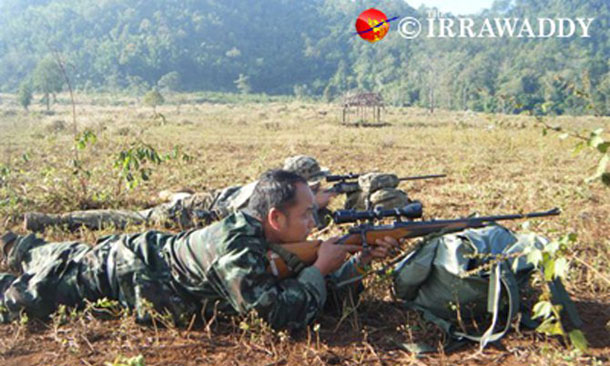CHIANG MAI, Thailand — Heavy fighting between the Burma Army and an ethnic Karen rebel group broke out in Kawkareik and Hlaingbwe townships in Karen State on Friday, forcing dozens of villagers to flee their homes.
The fighting between government soldiers and the Democratic Karen Benevolent Army (DKBA) also forced the closure of a road linking Burma’s commercial capital Rangoon to the border town of Myawaddy.
Maj. Saw Zorro, liaison officer in Myawaddy with the Karen National Union (KNU), the largest ethnic Karen armed group, told The Irrawaddy on Friday that the fighting began at 10 a.m. and lasted until around noon.
“We were informed by our troops close to the fighting areas that villagers nearby, including from Kawkareik, have fled their homes and are hiding because shells landed on their villages.”
Heavy weapons including artillery were used in the conflict between government and DKBA troops, Zorro said.
“For the safety of residents and civilians who travel by vehicle, the road from Kawkareik and Myawaddy is now closed. All transport has been shut down. Authorities worry that shells landing around the road might hit travelers.”
Villagers and traders mainly use the road that connects Rangoon via Hpa-an, the capital of Karen State, from Myawaddy, to transport goods. Myawaddy is one of Burma’s key border trading points with Thailand, with products from vegetables to vehicles daily transported across the border.
The DKBA troops involved in the fighting near Kawkareik were led by Col. Kyaw Thet and Col. San Aung. In Hlaingbwe Township, DKBA troops were led by Col. Saw Bi, sources said.
Tensions between various armed groups and government forces in areas of Karen and Mon states have been rising since September, despite bilateral ceasefire agreements signed between ethnic armed groups and Naypyidaw.
In late September, heavy fighting between the DKBA and the Burma Army broke out in Myawaddy Township, Karen State, and Kyaikmayaw Township, Mon State, forcing hundreds of villagers to flee their homes. Many of them are still too afraid to resume their daily work on farms and plantations.

















